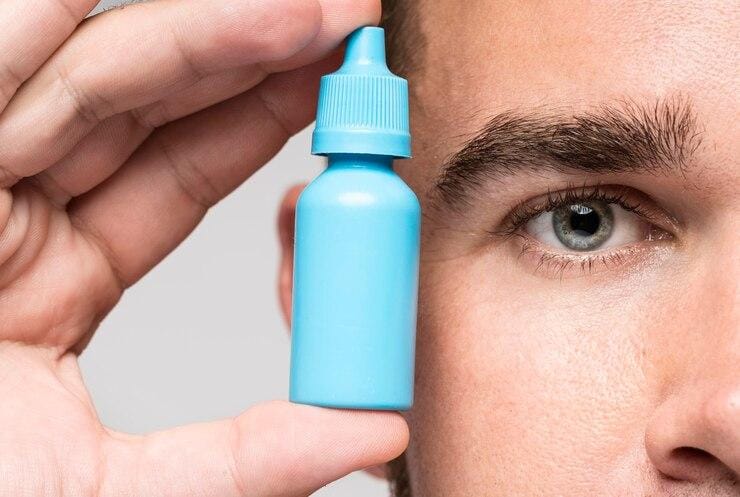FDA Eye Drops Recall 2023: What You Need to Know

This year has spooked consumers like no other, with multiple warnings from the FDA about dozens of eye drops that contain potential bacteria and contamination.
In January and February, the Food and Drug Administration recalled two over-the-counter eye drops-EzriCare Artificial Tears and Delsam Pharma’s Artificial Tears, after they were found to cause bacterial contamination. An outbreak of a rare drug-resistant strain of Pseudomonas aeruginosa was linked to the usage of these eye drops. Out of 55 patients in 12 states who use these drugs, one patient died of a bloodstream infection.
In August, the FDA warned people to stop buying or immediately stop using- LightEyez MSM eye drops and Dr Berne’s MSM 5% solution as these eye drops may lead to bacterial contamination, fungal contamination or both. FDA said that both of these eye drops contain methylsulfonylmethane, which is not allowed to be used in eye-related products in the United States.
In late October, the agency issued another eye drops recall. They raised concerns about 26 over-the-counter products, which are sold by brands such as CVS Health, Rite Aid, Leader and many more. FDA has found unsanitary conditions in their manufacturing unit and got positive test bacterial results in their facilities. According to the FDA, brands such as CVS, Rite Aid and Target are taking down their eye drops from the market, and eye drops of brands such as Leader, Rugby, and Velocity may still be available.
FDA warns people to get rid of these eye drops if they have them at home. The agency says if you have used any of these eye drops and are experiencing any issues or eye infections, seek the help of a medical professional or a health care provider.
Which eye drops should you avoid?
Until now, most of us feel safe when we buy eye drops from brands, but now we have to be extra careful. We need to do our research properly before purchasing eye drops, even from a brand.
It’s good to check the FDA website to know which eye drops have been recalled before using them. You can also check the website of the eye drop manufacturer to know whether the product you normally use has been recalled or not. If you still have concerns with the eye drops, talk to your doctor. They will recommend eye drops that are safe to use and ensure your eye health and well-being.
Which eye drops are recalled?
Here is the list of the eye drops that have been recalled by the FDA so far.
- Ezicare artificial
- Delsam Pharma’s Artificial Tears.
- Delsam Pharma Artificial Eye Ointment.
- Purely Soothing 15% MSM Drops.
- Clear Eyes Once Daily, Eye Allergy Itch Relief.
- Brimonidine Tartrate Ophthalmic Solution, 0.15%.
- LightEyez MSM Eye Drops–Eye Repair.
- Berne’s MSM Drops 5% Solution.
- Velocity Pharma LLC Lubricant Eye Drop 10 ml
- Target Up&Up Extreme Relief Dry Eye 30 ml
- Target Up&Up Extreme Relief Dry Eye 15 ml
- Target Up&Up Dry Eye Relief Lubricant Eye Drops 30 ml
- Rite Aid Eye Drops Multi-Action Relief Drops 15 ml
- Rite Aid Lubricating Gel Drops 10 ml
- Rite Aid Lubricant Gel Drops 15 ml
- Rite Aid Gentle Lubricant Gel Eye Drops 15 ml
- Rite Aid Lubricant Eye Drops 10 ml
- Rite Aid Lubricant Eye Drops 15 ml
- Leader (Cardinal Health) Eye Irritation Relief 15 ml
- Leader (Cardinal Health) Dry Eye Relief 15 ml
- Leader (Cardinal Health) Lubricant Eye Drops 15 ml
- Leader (Cardinal Health) Lubricant Eye Drops 15 ml
- Leader (Cardinal Health) Dry Eye Relief 10 ml
- Rugby (Cardinal Health) Polyvinyl Alcohol 1.4% Lubricating Eye Drops 15 ml.
- Rugby (Cardinal Health) Lubricating Tears Eye Drops 15 ml
- CVS Health Mild Moderate Lubricating Eye Drops 15 ml
- CVS Health Lubricant Eye Drops 10 ml
- CVS Health Lubricant Eye Drops 10 ml
- CVS Health Lubricating Gel drops 10 ml
- CVS Health Multi-Action Relief Drops 15 ml
- CVS Health Lubricant Gel Drops 15 ml
- CVS Health Lubricant Eye Drops 15 ml
- CVS Health Lubricant Eye Drops 15 ml
Note- Please visit the FDA website to get more information about the recalled products, such as lot number, national drug code, etc.
Signs and Symptoms of Eye Issues Caused by Eye Drops
Experts say that eye drops often cause infections in the cornea, which require early attention. Some symptoms that one can look out for while using eye drops are blurred vision, red eyes, significant sensitivity to light, eye swelling, and watery mucus discharge from the eyes. If you experience any of these symptoms, seek the advice of a medical professional and protect your eyes. In addition, you must also check the expiry date of the eye drops before using them. This is important because even a non-recalled, well-manufactured eye drop can be home to dozens of bacteria after the expiry date.
How to treat eye infections?
A healthcare professional is better equipped to treat the eye infections caused due to recalled eye drops. However, you can take some measures to get relief from your pain, discomfort and swelling. These measures include a cool or warm compress, applying artificial tears and taking pain relievers. But, it’s best to seek medical advice for proper treatment of the eye infection due to recalled eye drops. Remember that delaying treatment can lead to corneal scarring, which can impair vision and may require surgical treatment such as a corneal transplant.
The bottom line
At last, FDA recalls have significantly raised concerns about the safety of eye drops. So, consumers should be vigilant while using eye drops and keep themselves up to date with the latest recalls.

